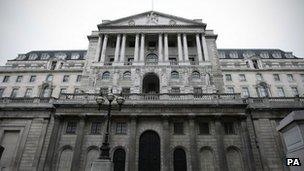Bank of England holds off from more stimulus measures
- Published

The Bank has kept interest rates on hold for more than three years
The Bank of England has kept interest rates on hold for August, and also held off from any more stimulus measures, as had been expected.
Its rate-setting Monetary Policy Committee (MPC) has voted to maintain rates at the historic low of 0.5%.
It also decided not to increase its programme of quantitative easing (QE), having lifted it by £50bn last month.
Under QE the Bank pumps fresh money into the banking system to try to boost lending and thus the wider economy.
Following last month's additional £50bn, the total value of the Bank's QE programme now stands at £375bn.
The Bank said in a statement that its QE programme would "take another three months to complete", and that its scale would "be kept under review".
The European Central Bank has also kept its main rate at a record low of 0.75%, after cutting it from 1% last month.
'Flat growth'
Adam Chester, head of UK macroeconomics at Lloyds Bank Corporate Markets, told the BBC that the Bank of England was waiting to see the impact of last month's increase in QE funds.
He added: "Clearly we have had a very disappointing GDP figure in the second quarter, down 0.7%, but we think that was heavily distorted by the extremely poor weather and the extra bank holiday in June.
"If you strip those out, the underlying figure is probably one of broad flat growth in the UK."
Anna Leach, head of economic analysis at the CBI business organisation, said the Bank's latest decisions were expected because of the recent extension of QE.
"However, the outlook for the UK economy remains fragile, particularly in light of the disappointing official data for the first half of the year and the recent slowdown in global momentum," she said.
New lending
The UK recession deepened between April and June, with output falling by 0.7%, official data released last week showed.
This contraction was much bigger than expected, and followed a 0.3% drop in the first three months of the year.
On Monday, the Bank of England and the Treasury launched a new scheme to increase lending to households and companies.
Under the Funding for Lending initiative, the Bank of England is initially expected to lend about £80bn at below-market rates to banks and building societies. But this could rise as the scheme progresses.